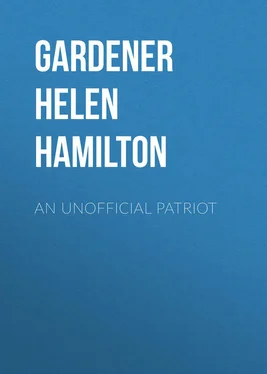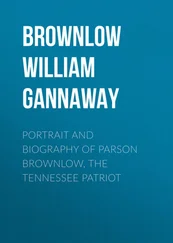Helen Gardener - An Unofficial Patriot
Здесь есть возможность читать онлайн «Helen Gardener - An Unofficial Patriot» — ознакомительный отрывок электронной книги совершенно бесплатно, а после прочтения отрывка купить полную версию. В некоторых случаях можно слушать аудио, скачать через торрент в формате fb2 и присутствует краткое содержание. Жанр: История, foreign_antique, foreign_prose, на английском языке. Описание произведения, (предисловие) а так же отзывы посетителей доступны на портале библиотеки ЛибКат.
- Название:An Unofficial Patriot
- Автор:
- Жанр:
- Год:неизвестен
- ISBN:нет данных
- Рейтинг книги:3 / 5. Голосов: 1
-
Избранное:Добавить в избранное
- Отзывы:
-
Ваша оценка:
- 60
- 1
- 2
- 3
- 4
- 5
An Unofficial Patriot: краткое содержание, описание и аннотация
Предлагаем к чтению аннотацию, описание, краткое содержание или предисловие (зависит от того, что написал сам автор книги «An Unofficial Patriot»). Если вы не нашли необходимую информацию о книге — напишите в комментариях, мы постараемся отыскать её.
An Unofficial Patriot — читать онлайн ознакомительный отрывок
Ниже представлен текст книги, разбитый по страницам. Система сохранения места последней прочитанной страницы, позволяет с удобством читать онлайн бесплатно книгу «An Unofficial Patriot», без необходимости каждый раз заново искать на чём Вы остановились. Поставьте закладку, и сможете в любой момент перейти на страницу, на которой закончили чтение.
Интервал:
Закладка:
All these things had come to Griffith as quite a matter of course; as some equally important things have come to you and to me – and not at all as matter of surprise or as questions for argument.
That his father, the old major, swore roundly, from time to time, at the slaves, did not appeal to the boy's mind as either strange or reprehensible; so true is it that those things which come to us gradually, and in the regular order of events, do not arouse within us doubts and questionings as do sudden or startling additions to our development or intellectual equipment, when thrust unexpectedly in upon our ordinary surroundings. Such moral or social questions as were involved in the ownership of slaves had, up to that time, produced no more mental qualms in the boy than have the same questions as to ownership of lands or of horses upon you or me at the present time.
Jerry had been Griffith's own particular "boy" ever since he could remember, and, although Jerry was the older of the two, it would be wholly unfair to all parties concerned not to state clearly and fully that the righteousness and inevitability of the relationship of owned and owner, had no more sinister meaning for Jerry than it had for his young "Mos' Grif." So prone are we all to accept as a finality that to which custom has inured us.
Was Jerry an Episcopalian? Most assuredly! Were not all of the Davenports members of the established order in all things? And was not Jerry a Davenport? Not one negro on the whole plantation had ever for one little moment thought of himself as other than an Episcopalian, – in so far as the Almighty would permit one whose skin was black to be of the elect. They one and all felt a real and eager pride in the social and religious status of the Davenports, and had never even harbored a doubt that they would be permitted to polish the harps and hold the horses of that fortunate family when all should again be reunited in that better world, where all might be free but not equal – for "as one star differed from another," etc. No different dreams had ever, so far, visited master or slave.
"I could never be happy in heaven without Jerry," had settled the question in Griffith's mind, for of course his own destination was sure. And the negro felt equally secure when he thought, "Mos' Grif ain't gwine ter go nowhah widout me. Nobody else ain't gwine ter take cahr ob him. Nobody else know how."
But the unsettling times which brought Methodism, in a great and overwhelming wave, into the ranks of established things, brought also mutterings and perplexities and awakenings of another sort. Aroused energies, stimulated consciences, excited mentalities are ever likely to find varying outlets. Progressive movements seldom travel singly, and so it came about that, mingled with the new religious unrest, there were other and, perhaps you will say, graver questions so inextricably joined, in some minds that the one appeared to be the root and cause of the other.
"Is slavery right? If it is right for the laity, at least, is it not wrong for one who is an apostle of the Son of God, who had not where to lay His head? Should black men be free men?" and all the disturbing horde of questions which followed in the train of the new religion, began to float, at first in intangible ways, in the air. A little later they took form in scowl or hasty word, and at last crept into sermons, social discussions and legislative deliberations, as by degrees the echo of these latter floated down from Washington or filtered through other sources, from the Border States, where the irrepressible conflict had arisen in a new form to vex the souls and arouse the passions of men. The pressing question of free soil or slave extension had already begun to urge itself upon the public mind and to harass the Border States, finding utterance for or against that Congressional measure known as the Missouri Compromise Bill. Young Griffith Davenport had spent his seventeen years in an atmosphere of scholarly investigation and calm, where little of even the echoes of these disturbing influences had come. His home was a comfortable one – indeed, the finest in all that part of the valley; the library quite unusual in extent and quality for the time and place. Grif's tutor was a University man, his pleasures those of a country 'squire; for in Virginia, as in England, the office of "esquire," or justice of the peace, was wont to pass from father to eldest son, in families of consideration; and, indeed, at that early age Grif's father had, by degrees, turned the duties of the office over to the boy, until now no one expected to consult the "old 'squire" upon any ordinary topic. The "young 'squire" settled it, whether it were a dispute over dog-slain sheep or a misunderstanding about the road tax.
Upon this placid, "established" finality of existence it was, then, which descended a cyclone. Formalism in religion had run its course. The protest was swift, impassioned, sincere. Vigorous, earnest, but often unlearned men sprang into prominence at a single bound. Arguments arose. Men began to ask if the Almighty was pleased with forms in which the soul was dead – if mere words, and not sincere emotion of the heart, gratified God. Was it worship to simply read or repeat the words of another? Must not one's own soul, mind and heart furnish the key, as well as the medium, to aid in real devotion? Had the letter killed the spirit?
Young Griffith heard. The ideas fascinated him. Oaths from his father's lips struck him with a new meaning and a different force. Whereas they had been mere vocal emphasis, now they were fearful maledictions – and from a leading Christian, the leading Christian of the county!
Griffith pondered, trembled, listened again to the new religious teachers – to whose meetings he had, at first, gone in a spirit of mild fun, not in the least reprobated by his father – and had, at last, tremblingly, passionately believed.
CHAPTER II
"I paint him in character."
That a Davenport should seriously contemplate leaving the "Mother Church." as the devotees of the Anglican establishment were given to calling their branch of the real Roman mother, was a proposition too absurd to be considered; and the old Major met his son's first suggestions, wherein this tendency was indicated, as the mere vaporings of a restless, unformed boy. He laughed loudly, guyed his son openly, and inquired jocosely which one of the pretty Methodist girls had struck his fancy.
"If it turns out to be serious, Grif, and you marry her, she will, as a matter of course, transfer her membership to the Mother Church. A true wife always follows her husband in all things. 'Thy people shall be my people, and thy God my God,' you know, Grif. Good old saying. Bible truth, my son. But who is the happy girl, you young scamp? There is rather a paucity of thoroughbreds among the Methodists, as they call this new craze. Don't make that kind of a mistake, my boy, whatever else you do. Better keep inside the paddock."
The old Major chuckled, and, turning on his heel, left his son covered with confusion, and with a sense of impotent zeal and conviction to which he could not or dared not give voice.
That this question of a truer, warmer, more personally stirring religious life did not touch a single responsive chord in the Major's nature, filled the son, anew, with misgivings. At first, these questionings led him to doubt himself, and to wonder if it could, after all, be possible that his own youth, inexperience and provincialism might really not lie at the root of his new unrest. He went to the Methodist meetings with a fresh determination to be serenely critical, and not to yield to the onrush of emotion which had grown so strong within him as he had listened, in the past, to the passionate and often ruggedly-eloquent appeals of the pioneers of the new faith – or, perhaps, it were better to say, to the new expression of the old faith. He gave up his extra Latin lessons, which had been his delight and the pride of his tutor and of his family, that he might have these hours for the study of the Bible and the few other books carried by the colporteurs or the circuit riders, who were beginning to overrun the State.
Читать дальшеИнтервал:
Закладка:
Похожие книги на «An Unofficial Patriot»
Представляем Вашему вниманию похожие книги на «An Unofficial Patriot» списком для выбора. Мы отобрали схожую по названию и смыслу литературу в надежде предоставить читателям больше вариантов отыскать новые, интересные, ещё непрочитанные произведения.
Обсуждение, отзывы о книге «An Unofficial Patriot» и просто собственные мнения читателей. Оставьте ваши комментарии, напишите, что Вы думаете о произведении, его смысле или главных героях. Укажите что конкретно понравилось, а что нет, и почему Вы так считаете.











